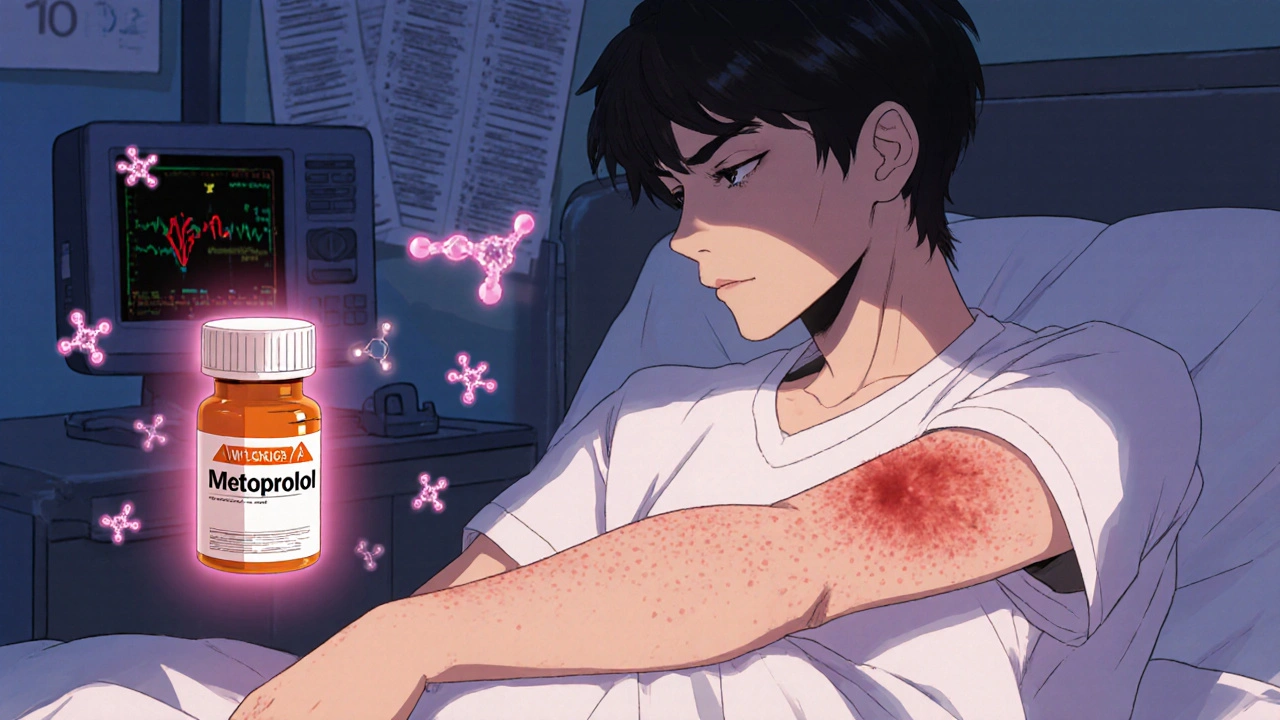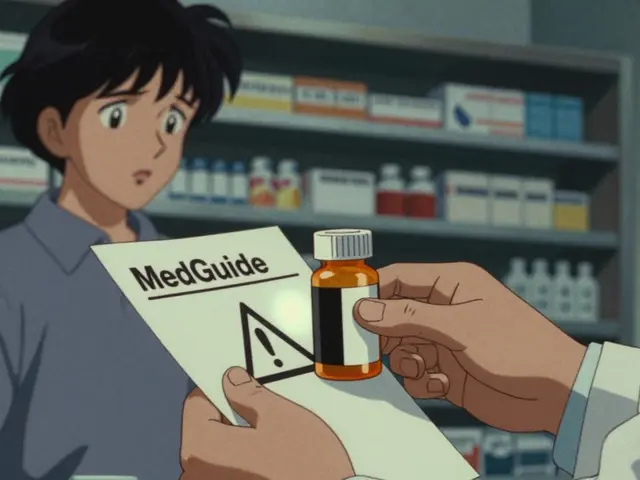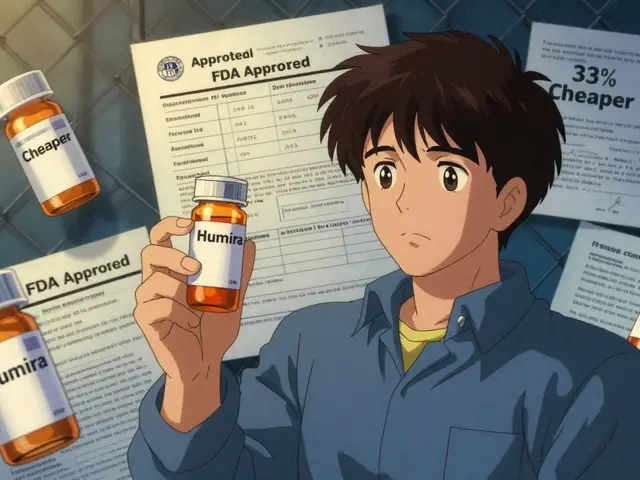
Psoriasis Beta-Blocker Risk Calculator
This tool helps you understand your potential risk of psoriasis flare when taking beta-blockers based on medical evidence from the article. Remember: Always consult your doctor before making any medication changes.
If you have psoriasis and were recently prescribed a beta-blocker for high blood pressure or heart issues, you’re not alone-and you’re not imagining things if your skin suddenly got worse. Thousands of people with psoriasis report flares after starting medications like metoprolol or propranolol. The connection isn’t just anecdotal. It’s backed by clinical studies, dermatology guidelines, and real patient experiences. The question isn’t whether it can happen-it’s whether it’s happening to you, and what to do next.
How Beta-Blockers Can Trigger Psoriasis Flares
Beta-blockers are a common class of drugs used to treat high blood pressure, irregular heartbeats, and even anxiety. They work by blocking the effects of adrenaline on your heart and blood vessels, which slows your heart rate and lowers blood pressure. But they don’t just affect your heart. These drugs also interact with receptors in your skin, and that’s where things go wrong for some people.Research shows that beta-blockers can interfere with the normal function of skin cells. They reduce levels of a signaling molecule called cyclic AMP (cAMP), which helps control how fast skin cells grow and how your immune system behaves in the skin. When cAMP drops, skin cells multiply too quickly, and inflammation ramps up-two hallmarks of psoriasis. This isn’t just theory. A 2020 review in PubMed Central (PMC7398737) confirmed this mechanism is behind many drug-induced psoriasis cases.
Not all beta-blockers carry the same risk. Propranolol, metoprolol, bisoprolol, and atenolol are the most commonly linked to flares. Even eye drops containing timolol-used for glaucoma-can cause problems because enough of the drug gets absorbed into your bloodstream to affect your skin. One case report described a patient whose psoriasis turned into a full-body red, scaly rash after using timolol eye drops for months.
Who’s Most at Risk?
If you already have psoriasis, you’re more likely to see a flare. DermNet NZ reports that about 20% of people with existing psoriasis experience worsening symptoms after starting a beta-blocker. But it’s not just about having the condition. Some people develop psoriasis for the first time after taking these drugs.The timing is tricky. Symptoms don’t show up right away. You might start the medication in January and not notice a flare until June-or even a year later. That delay is why so many people don’t connect their skin changes to their pills. One Reddit user, u/PsoriasisWarrior2024, shared that after six months on metoprolol, their psoriasis went from covering 5% of their body to 30%. They thought it was stress, not medication.
Genetics may play a role too. Early findings from a 2024 study at Johns Hopkins and Mayo Clinic suggest people with the HLA-C*06:02 gene variant-common in those with plaque psoriasis-are more likely to have a flare triggered by beta-blockers. This could one day help doctors choose safer medications before even prescribing.
What the Evidence Really Says
There’s some debate in the medical literature. A 2010 study (PMC2921739) concluded that long-term use of beta-blockers isn’t a major cause of new psoriasis. But that same study also found beta-blockers were a major factor in triggering flares in people who already had the disease. Another study published in the Journal of the American Academy of Dermatology looked at 110 hospitalized patients with severe psoriasis and found beta-blockers were among the top triggers.What’s clear is this: if you develop psoriasis or your existing psoriasis gets worse after starting a beta-blocker, and your symptoms improve after stopping it, that’s a strong sign the drug is the cause. Clinical improvement after withdrawal is one of the most reliable ways to confirm the link.
Still, not everyone reacts the same. Some people take beta-blockers for years with no skin issues. That’s why doctors often say it’s about individual risk-not a universal rule. But if you’re one of the 20% who reacts, the consequences can be serious-especially if the flare turns into pustular or erythrodermic psoriasis, which are rare but dangerous forms.

What to Do If You Suspect a Trigger
If you notice your skin getting worse after starting a beta-blocker, don’t stop the medication on your own. These drugs are often critical for heart health. Instead, talk to both your dermatologist and cardiologist. They can work together to find a solution.Here’s what your doctors might consider:
- Switch beta-blockers-but only if necessary. If one beta-blocker caused a flare, chances are another will too. Banner Health advises against trying a different one unless absolutely unavoidable.
- Switch to a different class of blood pressure medication. Calcium channel blockers like amlodipine or ARBs like losartan are often safer for people with psoriasis. ACE inhibitors can also trigger flares, so they’re not always the best alternative.
- Manage the flare. Topical steroids, vitamin D creams, and light therapy can help control symptoms while you adjust your meds. For severe cases, systemic treatments like biologics may be needed.
- Track your symptoms. Keep a journal of when your skin flares, what medications you’re on, and any other changes. This helps your doctors spot patterns.
One patient on MyPsoriasisTeam wrote, “I didn’t realize my blood pressure pill was making my psoriasis worse until my dermatologist asked if I was on beta-blockers.” That question saved her months of unnecessary suffering.
What About New-Onset Psoriasis?
Can beta-blockers cause psoriasis in someone who never had it before? The evidence is mixed, but it’s possible. GoodRx and Healthline both note that while new cases are less common than flares in existing patients, they do happen. The American Academy of Dermatology includes beta-blockers in its list of drugs most likely to trigger psoriasis, whether new or existing.There’s a historical example: Practolol, an older beta-blocker, was pulled from the market in the 1980s because so many users developed severe skin reactions, including psoriasis-like rashes. That’s how serious this link can be.

What’s Being Done to Fix This?
Researchers are looking for better solutions. Some pharmaceutical companies are working on new beta-blockers that target only the heart’s beta-1 receptors and avoid skin receptors altogether. Others are testing topical formulations with minimal absorption to reduce side effects.The European Academy of Dermatology now recommends that dermatologists ask every patient with new or worsening psoriasis: “Are you taking any beta-blockers?” That simple question is becoming standard practice. It’s a small step-but it can change lives.
Real Numbers, Real Impact
In the U.S., about 63 million prescriptions for metoprolol are filled each year. Around 8.1 million Americans have psoriasis. That means tens of thousands of people with psoriasis are likely on these drugs right now. A 2023 survey by MedicalNewsToday found that 37% of psoriasis patients on beta-blockers reported worsening skin, compared to just 12% of those on other blood pressure meds. Even if the sample size was small, the pattern is hard to ignore.The American Heart Association still recommends beta-blockers for certain heart conditions-but they now advise doctors to consider skin health when choosing medication, especially for patients with a history of psoriasis.
Bottom Line: Know Your Meds, Know Your Skin
Psoriasis is already hard to manage. Adding a medication that makes it worse feels unfair. But you’re not powerless. If you’re on a beta-blocker and your skin is flaring, talk to your doctors. Don’t assume it’s stress, weather, or diet. Ask: Could this be my medication?There are alternatives. Your heart health matters-but so does your skin. With the right team and the right questions, you can find a balance that keeps both in check.





10 Comments
My dermatologist never asked if I was on beta-blockers until my flare hit 40% of my body. I’d been on metoprolol for two years thinking it was stress or my diet. Turns out, it was the pill. Switched to amlodipine and my skin cleared up in six weeks. Why isn’t this standard protocol? Doctors treat psoriasis like it’s just a cosmetic issue, but it’s not. It’s systemic. Ask the question. Save yourself the misery.
And yes, I know some people take these meds with no issues-but if you’re one of the ones who reacts, you’ll wish you’d known sooner.
This is why I stopped trusting big pharma. They push these drugs like candy and then act surprised when people get sick. Beta-blockers were never meant to be taken for decades. The skin is an organ, not a side note.
Oh, here we go again-the ‘beta-blockers cause psoriasis’ narrative. Let me guess, you also think 5G is responsible for your eczema? This is the same logic that blamed vaccines for autism. The science is messy. A 2010 study says it’s not a major cause. A 2020 review says it might be. Which one do you believe? The one that fits your fear? Or the one that’s actually peer-reviewed?
And don’t even get me started on the ‘timolol eye drops’ story. That’s a single case report. One. Person. That’s not evidence, that’s a coincidence wrapped in a panic attack.
Meanwhile, millions of people take beta-blockers without a single skin issue. Maybe your immune system is the problem, not the medication. Maybe you need to stop blaming pills for your body’s failures.
And yes, I’ve read the JAAD study. And no, it didn’t prove causation. It proved correlation. Big difference. Don’t turn medical nuance into a cult manifesto.
I’ve lived with psoriasis for 18 years. I’ve tried everything-topicals, light therapy, biologics, diets, stress management. But nothing changed until I stopped blaming myself.
When I finally asked my cardiologist if my blood pressure meds could be the trigger, he looked at me like I’d spoken a foreign language. That’s the problem. We’re taught to be grateful for any medication that helps our heart. But what if it’s breaking our skin? What if the cure is worse than the disease?
I switched to losartan. Not because it’s ‘better’-but because it didn’t make me feel like I was melting from the inside out. My skin didn’t heal overnight. But it stopped getting worse. And that was the first real hope I’d had in years.
This isn’t about being anti-medication. It’s about being pro-wellness. Your heart matters. Your skin matters. Your body is not a collection of separate systems. It’s one whole thing. Treat it like that.
Did you know that beta-blockers were originally developed by a pharmaceutical company with ties to the CIA’s MK-Ultra program? They were testing mind-altering compounds on veterans, and when they noticed skin reactions, they buried the data. Now they’re pushing these same drugs on the public under the guise of ‘heart health.’
There’s a reason the FDA hasn’t issued a black box warning. They’re afraid of the lawsuits. But the truth is out there-if you dig deep enough. Check the 1980s Practolol recall documents. Same pattern. Same silence.
And don’t trust your dermatologist. They’re trained to treat symptoms, not ask questions. Ask your pharmacist. They’re the ones who see the adverse event reports. They know.
Stop whining. If your skin flares, get a new job. Don’t blame your meds. America doesn’t have time for this.
my doc gave me metoprolol and my psoriasis got worse. i switched to amlodipine and it got better. just sayin.
Look, I get it. You’re scared. You’re tired. You’re looking for someone to blame. But the truth? Beta-blockers are one of the safest classes of drugs we have. The real issue? You’re not managing your stress. You’re not sleeping. You’re eating junk. And now you’re blaming a pill that’s keeping you alive.
I’ve been on propranolol for 12 years. My psoriasis? Flares once a year, same as before. Coincidence? Maybe. But I’d rather live with a little redness than die of a heart attack because I listened to Reddit.
It’s not just beta-blockers. It’s the entire pharmaceutical-industrial complex. The FDA is compromised. The AMA is bought. The studies you cite? Funded by Big Pharma. The 2020 review? Written by someone who consults for AstraZeneca. The 2024 Johns Hopkins study? Has a patent pending on a ‘psoriasis-friendly’ beta-blocker.
They’re not trying to help you. They’re trying to sell you a new drug. They want you to switch from metoprolol to amlodipine… then to a biologic… then to a monthly injection that costs $10,000 a year.
They profit from your suffering. They profit from your fear. And they’re laughing all the way to the bank while you’re Googling ‘can beta-blockers cause psoriasis’ at 3 a.m.
Stop trusting the system. Start trusting yourself. And if you’re going to take a pill, take the one that doesn’t come with a patent.
beta blockers are a mind controll drug. they make you docile. that’s why they give em to ppl with psoriasis. to keep us quiet. the skin flare? that’s just the body fighting back. they don’t want us to know how strong we are. they want us to stay numb. i stopped mine. my skin got worse first… then it got better. now i’m 100% clear. they tried to silence me. but i’m still here.